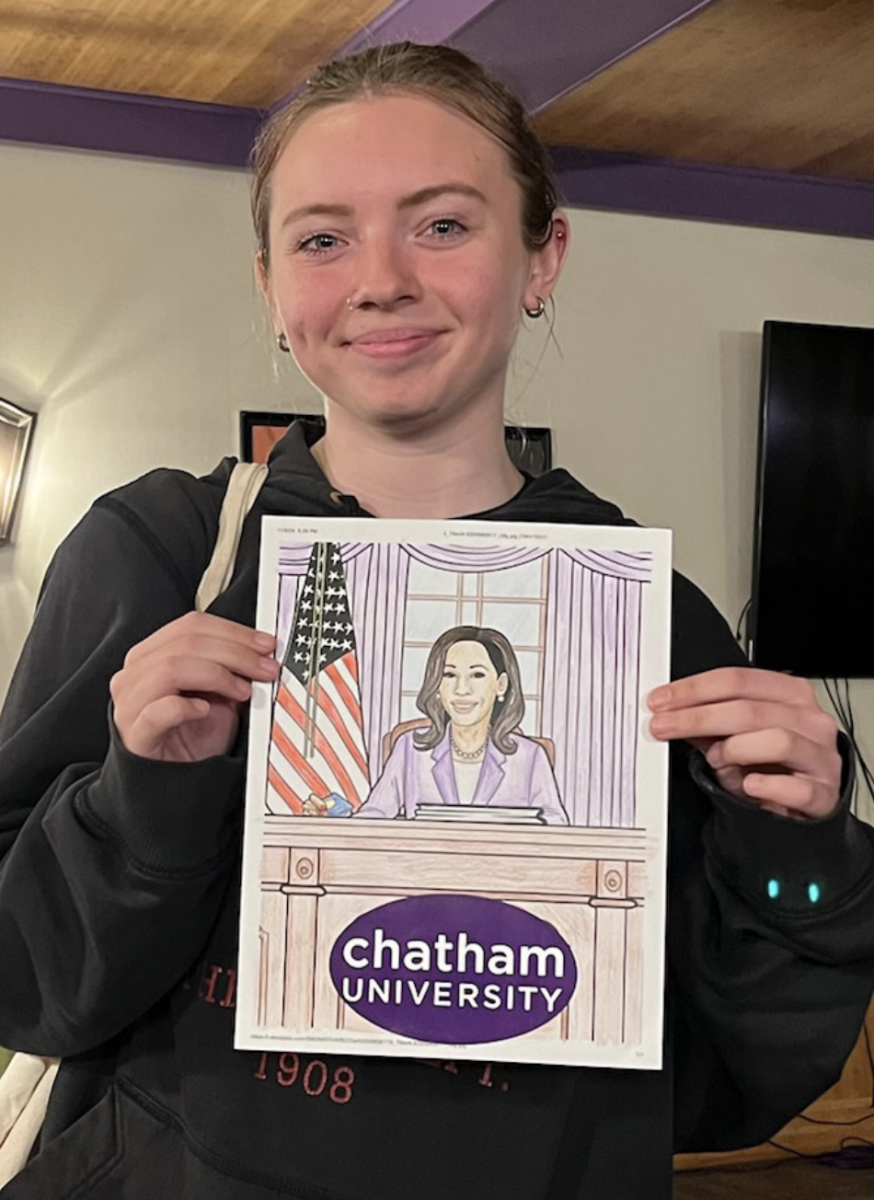During my four years at Chatham University, where I am pursuing a double major in communications and women & gender studies, I have learned that there will always be an ingrained gender bias in all aspects of government in a nation founded by the Founding Fathers.
On Election Day, voters cast ballots for the candidates they believe can best lead our nation. However, the Electoral College is what truly determines the president, as voters technically vote for a slate of electors pledged to those candidates. Every vote matters — for someone else to speak on your behalf.
In the late hours of Election Day and into the early hours of the following day, United States citizens, including Chatham University students, learned that former President Donald Trump was the first to earn 270 electoral votes, securing the presidency in the 2024 presidential race.
Waking up the day after Election Day, many at Chatham University were mourning. Students were crying and skipping classes, grieving the loss of a future they had hoped for — a future represented by the woman they had voted for: Vice President Kamala Harris.
As the president of the Chatham Feminist Coalition (CFC) and the vice president of Chatham University’s Zeta Zeta chapter of Triota – the National Women’s & Gender Studies Honor Society – my perspective on the election is not one of sadness and grief but of pride in what Harris was able to achieve in such a short time.
Despite the challenges, she campaigned vigorously while fulfilling her duties as vice president, making history as the second woman to be a major party candidate in the presidential race. Her journey has forged a leadership path in politics for women, especially women of color and Asian heritage, inspiring others to pursue their political aspirations.
I am optimistic. It is not always easy, but Harris’s story is a testament to the power of perseverance and resilience. Harris launched her 2024 presidential campaign after President Biden withdrew and endorsed her, giving her just 107 days to campaign—the shortest in history. She serves as a role model for women, showing that even in defeat, she paves the way for the woman who will one day be Madam President.
The media coverage will still be prejudiced by addressing female candidates by their first names, while male candidates are referred to by their last names. This can be observed in the comparisons between former first lady Hillary Clinton and Trump (Hillary v. Trump) during the 2016 presidential election and between Harris and Trump (Kamala v. Trump) in the current political landscape.
I am not claiming that the U.S. presidential election shows gender bias due to either candidate’s actions. I’m not an expert in campaign strategies or voter behavior. Nonetheless, cultural norms in politics often suggest that men are more suited for leadership roles, associating them with traits like ambition, risk-taking and war negotiations.
For a woman candidate, there is a fear of backlash for being called ambitious because it turns into the idea that a woman seeking the highest office in the country is greedy and vindictive.
For instance, in Clinton’s 2016 presidential election, throughout her campaign, she faced criticism that often revolved around her ambition and assertiveness, which she used in a negative context, suggesting that her desire for the presidency made her unlikable or overly aggressive. How is that different from the 45 men who have served in the 46 presidencies in the United States since 1789?
Furthermore, the lack of historical women leaders may reinforce doubts about women’s leadership capacity for the average voter.
The outcome of a presidential election in which a woman with substantial governmental experience within all three branches of government loses to a man who was found guilty of 34 counts of falsifying business records in the first degree and had no prior government experience before entering the 2016 presidential race, can have significant implications for gender equality and perceptions of women’s leadership in the United States.
All anyone can do is trust the foundation that the Founding Fathers have set for all of us, no matter how we interpret our democracy. We must hold hope for our democracy.
Not all Republicans align with Trump, nor do all Democrats align with Biden-Harris. We must be courteous and optimistic for one another because everyone around us upholds our nation. Take a look at the people on your left and to your right. Talk to each other, and let’s build a community rooted in understanding and, if it is not too much, respect.


